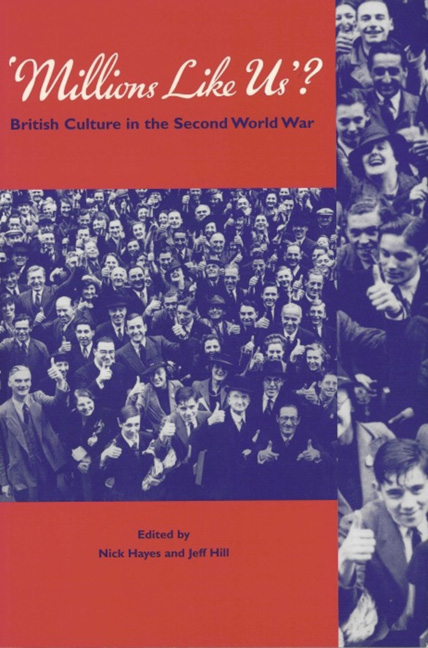Book contents
- Frontmatter
- Contents
- List of Figures and Tables
- Notes on Contributors
- Acknowledgements
- An ‘English War’, Wartime Culture and ‘Millions Like Us’
- British Cinema and ‘The People's War’
- The People's Radio: The BBC and its Audience, 1939–1945
- Was it the Mirror Wot Won it? The Development of the Tabloid Press During the Second World War
- A More Even Playing Field? Sport During and After the War
- A Time for Hard Writers: The Impact of War on Women Writers
- Safe and Sound: New Music in Wartime Britain
- More Than ‘Music-While-You-Eat’? Factory and Hostel Concerts, ‘Good Culture’ and the Workers
- ‘When Work Is Over’: Labour, Leisure and Culture in Wartime Britain
- Not Just a Case of Baths, Canteens and Rehabilitation Centres: The Second World War and the Recreational Provision of the Miners’ Welfare Commission in Coalmining Communities
- ‘You and I – All of Us Ordinary People’: Renegotiating ‘Britishness’ in Wartime
- Postscript: A War Imagined
- Index
A Time for Hard Writers: The Impact of War on Women Writers
- Frontmatter
- Contents
- List of Figures and Tables
- Notes on Contributors
- Acknowledgements
- An ‘English War’, Wartime Culture and ‘Millions Like Us’
- British Cinema and ‘The People's War’
- The People's Radio: The BBC and its Audience, 1939–1945
- Was it the Mirror Wot Won it? The Development of the Tabloid Press During the Second World War
- A More Even Playing Field? Sport During and After the War
- A Time for Hard Writers: The Impact of War on Women Writers
- Safe and Sound: New Music in Wartime Britain
- More Than ‘Music-While-You-Eat’? Factory and Hostel Concerts, ‘Good Culture’ and the Workers
- ‘When Work Is Over’: Labour, Leisure and Culture in Wartime Britain
- Not Just a Case of Baths, Canteens and Rehabilitation Centres: The Second World War and the Recreational Provision of the Miners’ Welfare Commission in Coalmining Communities
- ‘You and I – All of Us Ordinary People’: Renegotiating ‘Britishness’ in Wartime
- Postscript: A War Imagined
- Index
Summary
Angus Calder has suggested ‘that we, born since, have ignored how frightening and confusing the period from April 1940 through to June 1941 was for the British people. Perhaps we simply cannot comprehend that fear and confusion imaginatively.’ It may be especially the case that we cannot comprehend life in London in the Blitz, and the writing, which this essay explores, is often haunted by images of that city as embodying the experience of the Blitz. This essay is focused on the impact of the outbreak of the Second World War and the Blitz on some women writers who were then in their forties and fifties and had made a name for themselves in the preceding decades. Their understanding of what Nick Hayes has described in the introduction to this book as ‘a defining episode’ was recorded, reconstructed, re-created in a variety of sorts of writing: diaries, letters, autobiography, articles and novels. That understanding was complex and subtle, often anguished – they took themselves very seriously – and always individual.
The singularity and immediacy of responses to the war contained in these writings is the main focus of this essay. My contention is that the authors’ skill as writers enabled them to capture for us a historical moment of dislocation with unusual intensity. These women writers were also aware of their own political and social contexts, so that their reactions and reflections are often consciously placed within a broader framework. They gave expression to their ideas about gender, patriotism, culture and their sense of identity as writers in wartime. As successful women writers they had reached a position before the war of feeling part of a shared culture, and none of them claimed to write ‘as a woman’. The stability of their place within the culture of which they were a publicly visible part was challenged by the war: war faced them with a crisis which destabilized their sense of identity as writers. This destabilization is the focus of the first section of this essay. The middle section concentrates on the complex feelings of personal and communal responsibility for the preservation of cultural values with which these writers wrestled within a context of terror and destruction. The third part contains a reading of the writers’ understanding of the war's relevance to class and gender.
- Type
- Chapter
- Information
- Millions Like Us?British Culture in the Second World War, pp. 156 - 178Publisher: Liverpool University PressPrint publication year: 1999

